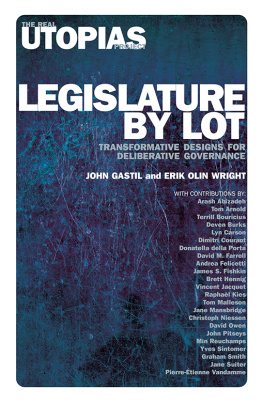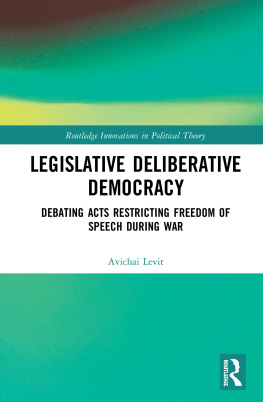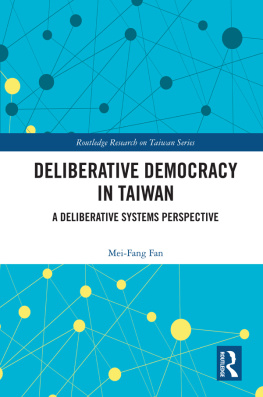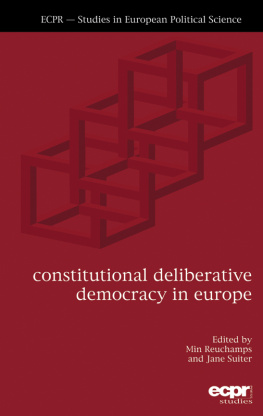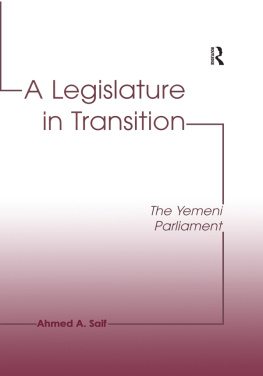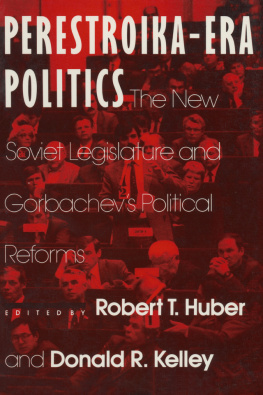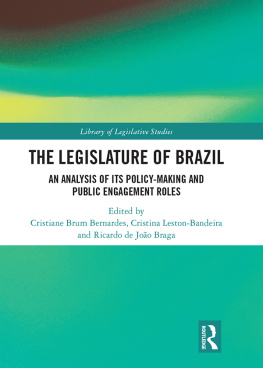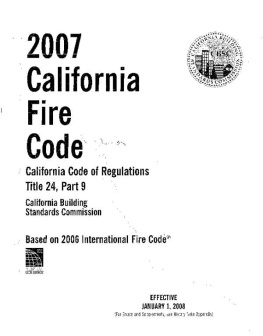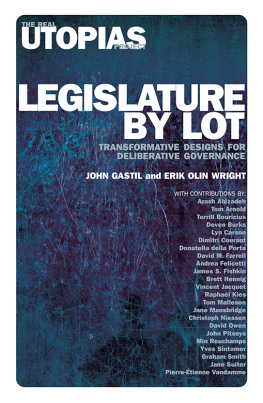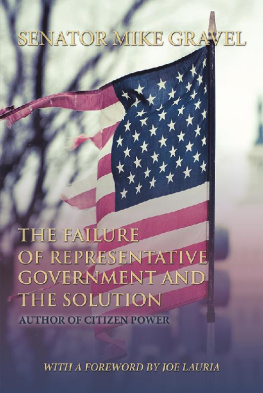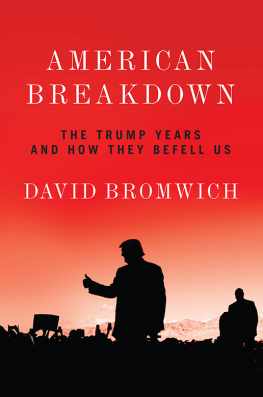Contents

Legislature by Lot
The Real Utopias Project
Series editor: Erik Olin Wright
The Real Utopias Project embraces a tension between dreams and practice. It is founded on the belief that what is pragmatically possible is not fixed independently of our imaginations, but is itself shaped by our visions. The fulfillment of such a belief involves real utopiasutopian ideals grounded in the real potentials for redesigning social institutions.
In its attempt at sustaining and deepening serious discussion of radical alternatives to existing social practices, the Real Utopias Project examines various basic institutionsproperty rights and the market, secondary associations, the family, the welfare state, among othersand focuses on specific proposals for their fundamental redesign. The books in the series are the result of workshop conferences, at which groups of scholars respond to provocative manuscripts.
Legislature by Lot
Transformative Designs for
Deliberative Governance
John Gastil and Erik Olin Wright

First published by Verso 2019
The collection Verso 2019
Contributions The contributors 2019
All rights reserved
The moral rights of the authors have been asserted
1 3 5 7 9 10 8 6 4 2
Verso
UK: 6 Meard Street, London W1F 0EG
US: 20 Jay Street, Suite 1010, Brooklyn, NY 11201
versobooks.com
Verso is the imprint of New Left Books
ISBN-13: 978-1-78873-608-4
ISBN-13: 978-1-78873-612-1 (HBK)
ISBN-13: 978-1-78873-611-4 (US EBK)
ISBN-13: 978-1-78873-609-1 (UK EBK)
British Library Cataloguing in Publication Data
A catalogue record for this book is available from the British Library
Library of Congress Cataloging-in-Publication Data
A catalog record for this book is available from the Library of Congress
Typeset in Sabon LT by Hewer Text UK Ltd, Edinburgh
Printed and bound by CPI Group (UK) Ltd., Croydon, CRo 4YY
Contents
The papers in this volume are drawn from a September 2017 Real Utopias Project conference on the idea of creating a legislative assembly in which legislators are chosen through a civic lottery. The conference was anchored by a specific proposal we prepared, along with a postscript by Erik Olin Wright. We make the argument for a bicameral legislature in which the legislators in one chamber are selected through elections and in the other are chosen by random selection. Our opening essay reviews the democratic flaws intrinsic in electoral representation, lays out a set of principles that should guide the construction of a sortition chamber, and argues for the virtue of a bicameral system that combines sortition and elections. Participants in the September 2017 conference responded to this proposal, and a selection of those appear in this special issue.
The first set of response essays looks at our proposal in the contemporary context. Yves Sintomer begins with From Deliberative to Radical Democracy: Sortition and Politics in the Twenty-First Century. He presents a broad historical overview of the role of sortition ideas in democratic theory. James S. Fishkin draws on extensive experience using deliberative minipublics, as well as some lessons from ancient Athens, to explore what could be the optimal use of sortition in a legislative system. In Random Assemblies for Lawmaking: Prospects and Limits, he argues against a long-term full-function sortition legislature in favor of a more targeted use of sortition assemblies.
Teams of coauthors provide the other three essays in this first section. Tom Arnold, David M. Farrell, and Jane Suiter offer their perspective based on one of the best real-world analogies to our proposal in Lessons from a Hybrid Sortition Chamber: The 201214 Irish Constitutional Convention. Pierre-tienne Vandamme and his coauthors present an empirical exploration of attitudes toward sortition in Belgium, including a sample of political officials. In Intercameral Relations in a Bicameral Elected and Sortition Legislature, they provide a context for discussing the possible public support for sortition proposals. Andrea Felicetti and Donatella della Porta then consider how sortition would operate in relation to movements in Joining Forces: The Sortition Chamber from a Social-Movement Perspective.
The next set of essays focuses more squarely on problemsand opportunitiespresented by sortition in relation to core democratic principles. In Should Democracy Work Through Elections or Sortition?, Tom Malleson lays out a general scorecard for evaluating the democratic quality of different legislative systems, then makes a point-by-point comparison of electoral assemblies and sortition assemblies. Jane Mansbridge offers a novel perspective on sortitions connection between legislators and citizens in Accountability in the Constituent-Representative Relationship. Lyn Carson stresses the procedural features necessary for effective governance in How to Ensure Deliberation Within a Sortition Chamber. Dimitri Courant suggests that sortitions distinctive qualities have nonobvious democratic virtues in Sortition and Democratic Principles: A Comparative Analysis. Finally, Arash Abizadeh extends Gastil and Wrights argument for a bicameral approach through his chapter, In Defense of Imperfection: An Election-Sortition Compromise.
The final collection of essays considers alternative approaches to incorporating sortition in a democratic system. Deven Burks and Raphal Kies begin with a note of caution in A Gradualist Path Toward Sortition. David Owen and Graham Smith advance this argument further in Sortition, Rotation, and Mandate: Conditions for Political Equality and Deliberative Reasoning. They are sympathetic to the goals of sortition but skeptical about the viability of a full-function sortition legislature. Brett Hennig questions the necessity of pairing sortition with an elected chamber in Who Needs Elections? Accountability, Equality, and Legitimacy Under Sortition. Finally, in Why Hybrid Bicameralism Is Not Right for Sortition, Terrill Bouricius argues strongly against retaining an electoral chamber and against the feasibility of a full-function sortition legislature. His favored alternative uses a series of more special-purpose sortition lawmaking bodies.
We close the volume by offering reflections on sortition informed by all of the response essays and the September 2017 conference that gave rise to this volume. In Sortitions Scope, Contextual Variations, and Transitions, we acknowledge difficulties in our original proposal, but we stress the need for a sortition chamber with a broad remit. We acknowledge the difficulty of designing a system apart from a specific sociopolitical context, and we recognize the variety of paths that sortition could take. Before long, small and large bodies may begin to experiment more vigorously with this ancient method of democracy. We hope this set of essays helps clear the path for this transition.
Legislature by
Lot: Envisioning
Sortition Within a
Bicameral System
Democracy embodies a tension between utopian aspirations and practical realities. The utopian ideal holds that ordinary people should be empowered to govern themselves. Democracy means rule by the people, not by elites, and if this were fully realized, the people would themselves actually rule. In practice, even the most robust democracies delegate most rulemaking to professional politicians, who are elected by the people or by bureaucratic officials employed by the state. Ordinary citizens may choose their rulers and hold them accountable, but the people do not themselves rule.

